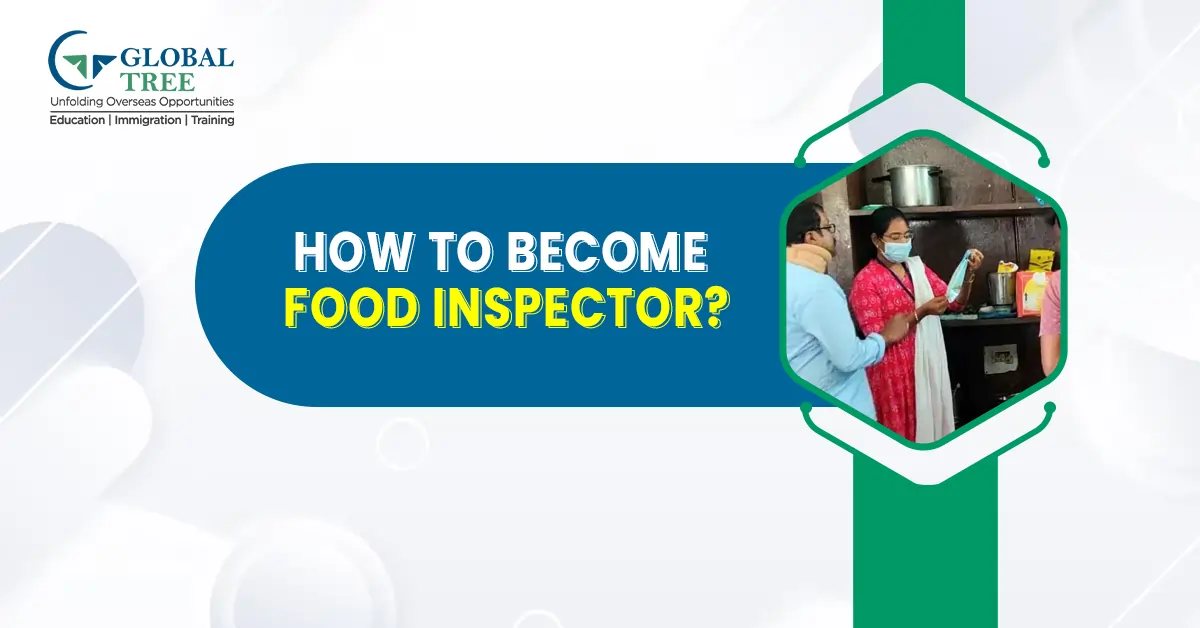How to Become Food Inspector?

- Introduction
- Who is a Food Inspector?
- Roles and Responsibilities of a Food Inspector
- How to Become a Food Inspector in India?
- 1. Educational Qualifications
- 2. Relevant Certifications and Diplomas
- 3. Competitive Exams
- 4. Practical Training and Internship
- 5. Apply for Food Inspector Positions
- What are the key Skills Required for a Food Inspector?
- What are the Career Prospects and Growth Opportunities of a food inspector?
- What are the challenges of becoming a Food inspector?
- Conclusion
- Frequently asked questions (FAQs)
Introduction
Becoming a food inspector is an ideal career path for individuals passionate about public health, food safety, and ensuring that the food we consume meets the highest standards of quality. Food inspectors play a crucial role in protecting public health by ensuring that food production processes comply with regulations and that food products are safe for consumption. This article will guide you through the process of becoming a food inspector in India and abroad, covering the necessary courses, exams, skills, and career prospects.
Who is a Food Inspector?
A food inspector is a professional responsible for inspecting food processing facilities, restaurants, farms, and other establishments involved in the production, storage, and distribution of food. They ensure that these establishments adhere to local, national, and international food safety standards and regulations. Food inspectors work in various sectors, including government agencies, private companies, and international organizations.
(Read more: How to pursue a Food science course abroad?)
Roles and Responsibilities of a Food Inspector
Food inspectors are tasked with several responsibilities to ensure food safety and quality. Some of the key food inspector requirements include:
- Inspecting Food Production Facilities: Conducting routine inspections of food processing plants, slaughterhouses, farms, and food storage facilities to ensure they comply with safety and hygiene standards.
- Sampling and Testing: Collecting food samples for laboratory analysis to detect contaminants, pathogens, or harmful substances that may pose a risk to public health.
- Reviewing Documentation: Checking records and documentation related to food production, such as ingredient lists, manufacturing processes, and expiration dates, to ensure compliance with regulations.
- Enforcing Food Safety Regulations: Ensuring that food establishments follow food safety laws and guidelines set by regulatory bodies. This may involve issuing warnings, fines, or shutting down facilities that violate regulations.
(Know more: How to be an SI and what are the duties?)
- Educating and Advising: Providing guidance to food producers and handlers on best practices for food safety and hygiene. This includes training on proper food handling, storage, and preparation techniques.
- Investigating Complaints: Responding to consumer complaints about food products, conducting investigations, and taking appropriate action to address any issues.
How to Become a Food Inspector in India?
In India, becoming a food inspector requires a combination of relevant education, training, and passing competitive exams. Below are the steps to pursue a career as a food inspector in India:
1. Educational Qualifications
The first step to becoming a food inspector in India is obtaining the necessary educational qualifications. The minimum requirement is usually a bachelor's degree in a related field. Some of the common degree courses that aspiring food inspectors can pursue include:
- Bachelor of Science (B.Sc.) in Food Science and Technology
- Bachelor of Science (B.Sc.) in Agriculture
- Bachelor of Science (B.Sc.) in Microbiology
- Bachelor of Science (B.Sc.) in Biochemistry
- Bachelor of Technology (B.Tech.) in Food Technology
- Bachelor of Science (B.Sc.) in Chemistry
While a bachelor's degree is the minimum requirement, some positions may require candidates to have a master's degree or higher in a related field. Additionally, degrees in public health, environmental health, and food safety can also be advantageous.
2. Relevant Certifications and Diplomas
In addition to a bachelor's degree, obtaining certifications and diplomas in food safety and related fields can enhance your qualifications. Some of the certifications and diploma courses available in India include:
- Diploma in Food Safety and Quality Management
- Postgraduate Diploma in Food Safety and Standards
- Certificate Course in Food Safety
- HACCP (Hazard Analysis Critical Control Point) Certification
- ISO 22000 Lead Auditor Certification
These certifications not only provide specialized knowledge in food safety but also increase your employability and chances of getting selected for food inspector positions.
3. Competitive Exams
In India, food inspector positions are often filled through competitive exams conducted by various government bodies. Some of the key exams include:
- Food Safety and Standards Authority of India (FSSAI) Exam: FSSAI is the primary regulatory body for food safety in India. They conduct recruitment exams for various positions, including food inspectors. This exam is one of the top paying government jobs in India and typically includes sections on general awareness, English language, reasoning, and subject-specific knowledge.
- State Public Service Commission (PSC) Exams: Various state public service commissions, such as the Maharashtra Public Service Commission (MPSC) and Uttar Pradesh Public Service Commission (UPPSC), conduct exams to recruit food inspectors for state-level positions. The syllabus usually includes topics on food safety, general science, and current affairs.
- Union Public Service Commission (UPSC) Exams: While not specifically for food inspectors, the UPSC conducts exams for positions in the Indian Revenue Service (IRS) and Indian Administrative Service (IAS), where food safety roles may be available.
4. Practical Training and Internship
Practical experience is crucial for a career as a food inspector. Aspiring candidates can gain experience through internships and training programs at food processing companies, laboratories, and government agencies. Many universities and colleges offer internship opportunities as part of their curriculum, allowing students to work in real-world settings and apply their knowledge.
5. Apply for Food Inspector Positions
Once you have the necessary qualifications and experience, you can apply for food inspector positions in government agencies, food processing companies, and other relevant organizations. Keep an eye on job notifications from FSSAI, state public service commissions, and other regulatory bodies. The selection process typically involves written exams, interviews, and document verification.
(Suggested Read: How to become an Income Tax officer in India?)
What are the key Skills Required for a Food Inspector?
Being a food inspector requires a combination of technical knowledge, analytical skills, and personal qualities. Here are some of the key skills needed for a successful career as a food inspector:
- Attention to Detail: Food inspectors must have a keen eye for detail to identify potential safety hazards, violations, and non-compliance issues during inspections.
- Analytical Thinking: The ability to analyze data, test results, and reports is crucial for making informed decisions about food safety.
- Communication Skills: Effective communication is essential for interacting with food producers, handlers, and regulatory authorities. Food inspectors must be able to explain complex regulations and procedures clearly.
- Problem-Solving Skills: Food inspectors must develop problem solving skills to be able to quickly identify issues and develop practical solutions to ensure compliance with food safety standards. This includes determining the cause of contamination, suggesting corrective actions, and preventing future occurrences.
- Technical Knowledge: A strong understanding of food science, microbiology, chemistry, and food safety regulations is essential. Food inspectors need to stay updated on the latest developments in food safety and quality control.
- Ethical Judgment: Food inspectors must uphold high ethical standards to ensure that their inspections are impartial and that they act in the best interest of public health. Integrity is crucial in making decisions that could impact the safety of the food supply.
- Time Management: Inspectors often have to manage multiple inspections, reports, and follow-ups. Time management skills and the ability to prioritize tasks are important for meeting deadlines and ensuring thorough inspections.
(Read More: How to master time management in fieldwork?)
- Physical Stamina: The job can be physically demanding, requiring long hours of standing, walking, and sometimes working in challenging environments such as food processing plants or farms.
What are the Career Prospects and Growth Opportunities of a food inspector?
A career as a food inspector offers various growth opportunities both in India and abroad. Depending on your experience, education, and skills, you can advance to higher positions within regulatory bodies, private companies, or international organizations. Some of the potential career paths include:
- Senior Food Inspector: With experience, you can advance to a senior inspector role, where you’ll oversee junior inspectors, manage larger inspection projects, and have a greater influence on food safety policies.
- Food Safety Auditor: Food safety auditors conduct detailed audits of food processing facilities to ensure compliance with international standards such as ISO 22000 and HACCP. This role often involves working for certification bodies or as a consultant.
- Regulatory Affairs Specialist: In this role, you would work closely with government agencies and companies to ensure that food products comply with local and international regulations. This position requires a deep understanding of food laws and the ability to navigate complex regulatory frameworks.
Note: Personality development is essential for achieving success in food inspection. Being confident and authentic is key to fulfilling your role effectively.
- Food Quality Manager: As a food quality manager, you would be responsible for overseeing the quality control processes within a food production facility. This role involves implementing quality assurance programs, training staff, and ensuring that products meet safety and quality standards.
- International Food Safety Consultant: For those interested in working abroad or with international organizations, becoming a food safety consultant can be a rewarding career. Consultants provide expert advice on food safety practices, conduct audits, and help companies comply with global food safety regulations.
- Policy Advisor: With experience and expertise, you could move into a policy advisor role, working with government bodies or international organizations to develop and implement food safety policies and regulations.
What are the challenges of becoming a Food inspector?
While a career as a food inspector can be rewarding, it also comes with its challenges. Some of the key considerations include:
- Regulatory Complexity: Food safety regulations can be complex and vary significantly between countries and regions. Staying informed about changes in regulations and ensuring compliance can be challenging, especially for those working in international contexts.
- High Responsibility: Food inspectors bear a significant responsibility for public health. Making accurate decisions during inspections is crucial, as mistakes can lead to serious health risks or legal consequences.
- Continuous Learning: The field of food safety is constantly evolving, with new technologies, standards, and threats emerging regularly. Food inspectors must commit to continuous learning and professional development to stay effective in their roles.
- Work Environment: The work environment can be demanding, with inspectors often required to work in food processing plants, farms, or other facilities that may have challenging conditions. This includes exposure to cold storage areas, loud machinery, or even hazardous substances.
- Travel Requirements: Food inspectors may need to travel frequently, especially if working for regulatory bodies or as consultants. This can be both a challenge and an opportunity, depending on personal preferences and lifestyle.
Conclusion
Becoming a food inspector in India and abroad is a fulfilling career choice for those passionate about food safety and public health. It offers a unique blend of science, regulation, and hands-on inspection work. By following the outlined steps, including obtaining the necessary education, certifications, and experience, you can embark on a career that not only provides job security but also contributes to the well-being of society.
(Suggested Read: Can Indians study Dietetics course abroad?)
Frequently asked questions (FAQs)
1. What are the minimum educational qualifications required to become a food inspector in India?
To become a food inspector in India, the minimum educational qualification is typically a Bachelor’s degree in fields related to food science, agriculture, chemistry, biology, or a related discipline. Degrees in specialized areas such as Food Technology, Microbiology, or Biotechnology are particularly advantageous. Additionally, candidates must pass specific competitive exams conducted by state or central government agencies, such as the FSSAI recruitment exam or exams held by the State Public Service Commissions.
2. How can I gain the necessary experience to become a food inspector if I am just starting out?
Gaining relevant experience to become a food inspector can start with internships or entry-level positions in food manufacturing, quality control, or laboratories. These roles provide practical insights into food safety practices and standards. Additionally, participating in certification courses like HACCP or ISO 22000 can bolster your qualifications. Volunteering for food safety projects or working with regulatory bodies, if possible, can also enhance your experience and make you a strong candidate for food inspector positions.
3. Is it possible to work as a food inspector abroad with qualifications obtained in India?
Yes, it is possible to work as a food inspector abroad with qualifications obtained in India, but it may require additional certifications or meeting the specific regulatory requirements of the country where you wish to work. Countries like the USA, Canada, Australia, and those in the European Union often have their own food safety standards and certification requirements. It’s advisable to research the specific qualifications needed in the country of interest and consider pursuing any additional certifications or exams required to meet those standards. Additionally, gaining international experience through internships or certifications recognized globally can improve your chances of securing a position abroad.
4. What are the key skills required to become a successful food inspector?
To be a successful food inspector, candidates should have strong attention to detail, analytical skills, and a good understanding of food safety regulations. Knowledge of food laws, hygiene practices, and quality control is essential. Effective communication skills, both for reporting findings and for interacting with stakeholders, are also crucial in this role.
5. What is the role of a food inspector in ensuring food safety?
A food inspector’s primary role is to ensure that food products meet safety and quality standards set by regulatory authorities. This includes inspecting food establishments, conducting tests on food samples, reviewing documentation, and enforcing food safety laws. They also play a key role in preventing foodborne illnesses by monitoring the hygiene and safety practices in the food supply chain.
6. What are the career advancement opportunities for food inspectors in India?
Food inspectors in India can advance to higher positions such as senior food safety officer, food safety auditor, or even roles in food quality control management. With experience, they may also move into managerial or supervisory roles within food regulatory bodies or in large food manufacturing companies. Additionally, pursuing higher education or specialized certifications can further open doors to leadership positions.
7. How does the FSSAI (Food Safety and Standards Authority of India) recruitment process work?
The recruitment process for food inspectors under FSSAI involves a competitive exam that tests candidates on topics such as food laws, food safety management systems, and general awareness. Candidates who pass the exam are then selected for a detailed interview and, in some cases, a practical assessment. The selected candidates are appointed as food inspectors or food safety officers with FSSAI or related government departments.
8. What are the challenges faced by food inspectors in their daily work?
Food inspectors often face challenges such as dealing with non-compliant food establishments, handling contaminated or substandard food products, and enforcing regulations in a market that may not always prioritize food safety. They may also have to manage large volumes of inspections under strict deadlines while maintaining objectivity and impartiality. Staying updated with constantly changing food safety regulations can also be a challenge.
9. Can I work as a food inspector in the private sector?
Yes, food inspectors can work in the private sector, especially in food manufacturing, quality control, and food safety consultancy. Many large food corporations, private laboratories, and third-party inspection agencies require certified food inspectors to ensure their products meet safety standards. Working in the private sector often provides opportunities to be involved in product development, food safety auditing, and compliance management.
10. What is the salary range for a food inspector in India?
The salary of a food inspector in India varies depending on experience, qualifications, and the organization they work for. On average, a food inspector working in the government sector can earn between ₹30,000 to ₹50,000 per month. However, salaries may increase with experience, seniority, and positions in the private sector, with some roles offering higher compensation.
11. Are there any specific certifications or courses I should take to enhance my career as a food inspector?
Certifications like HACCP (Hazard Analysis and Critical Control Points), ISO 22000, and FSSAI certification programs can enhance your qualifications. Specialized training in food safety audits, microbiological testing, and food laws also adds value. Pursuing postgraduate courses in Food Technology, Food Safety, or Public Health can improve career prospects and open doors to advanced positions.
12. What are the working conditions like for food inspectors in India?
Food inspectors typically work in diverse environments, including food manufacturing plants, government offices, laboratories, and, occasionally, on-site visits to restaurants and retail food stores. The job may require fieldwork, including long hours and travel. They must adhere to strict protocols and safety procedures to ensure their own health and safety while inspecting food products.









